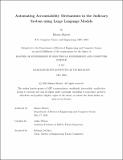| dc.contributor.advisor | Wilson, Ashia | |
| dc.contributor.author | Shastri, Ishana | |
| dc.date.accessioned | 2024-09-16T13:46:54Z | |
| dc.date.available | 2024-09-16T13:46:54Z | |
| dc.date.issued | 2024-05 | |
| dc.date.submitted | 2024-07-11T14:36:43.319Z | |
| dc.identifier.uri | https://hdl.handle.net/1721.1/156750 | |
| dc.description.abstract | Holding the judicial system accountable often demands extensive effort from auditors who must meticulously sift through numerous disorganized legal case files to detect patterns of bias and systemic errors. For example, the high-profile investigation into the Curtis Flowers case took nine reporters a full year to assemble evidence about the prosecutor’s history of selecting racially-biased juries. Large Language Models (LLMs) have the potential to automate and scale these accountability pipelines, especially given their demonstrated capabilities in both structured and unstructured document retrieval tasks. We present the first work elaborating on the opportunities and challenges of using LLMs to provide accountability in two legal domains: bias in jury selection for criminal trials and housing eviction cases. We find that while LLMs are well-suited for information extraction from eviction forms that have more structure, court transcripts present a unique challenge due to disfluencies in transcribed speech. | |
| dc.publisher | Massachusetts Institute of Technology | |
| dc.rights | In Copyright - Educational Use Permitted | |
| dc.rights | Copyright retained by author(s) | |
| dc.rights.uri | https://rightsstatements.org/page/InC-EDU/1.0/ | |
| dc.title | Automating Accountability Mechanisms in the Judiciary System using Large Language Models | |
| dc.type | Thesis | |
| dc.description.degree | M.Eng. | |
| dc.contributor.department | Massachusetts Institute of Technology. Department of Electrical Engineering and Computer Science | |
| mit.thesis.degree | Master | |
| thesis.degree.name | Master of Engineering in Electrical Engineering and Computer Science | |
